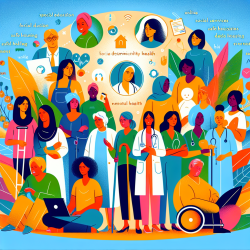As practitioners in the field of special education and therapy services, understanding the barriers faced by marginalized groups is crucial for improving service delivery. The research article "Pursuit of Equity: Women on a Low Income Navigating Access to Health and Social Services in Canada" provides valuable insights into the challenges encountered by low-income women seeking health and social services. This blog post explores how these findings can inform and enhance practitioner skills.
The Complexity of Navigating Health and Social Services
The study highlights the labyrinth-like complexity that low-income women face when accessing health and social services. This complexity often results in frustration and feelings of being ignored by service providers. Practitioners can improve their skills by:
- Simplifying Processes: Work towards creating streamlined processes that are easy to navigate for clients.
- Improving Communication: Ensure clear communication about available services and how to access them.
The Importance of Mental Health Sanctuaries
Mental health sanctuaries emerged as a critical theme in the research. Women reported that having a safe space for reflection and emotional support was vital. Practitioners can enhance their approach by:
- Creating Safe Spaces: Develop environments where clients feel secure to express their concerns without judgment.
- Providing Emotional Support: Offer consistent emotional support through therapy sessions or support groups.
The Value of Supportive Networks
The study underscores the importance of supportive networks, including community agencies that provide non-judgmental support. Practitioners should consider:
- Building Community Partnerships: Collaborate with local organizations to offer comprehensive support to clients.
- Encouraging Peer Support: Facilitate peer support groups where clients can share experiences and advice.
Moving Towards Person-Centered Care
The findings advocate for a shift towards more person-centered care in health and social service systems. Practitioners can focus on:
- Recognizing Unique Challenges: Acknowledge the specific challenges faced by equity-deserving groups and tailor services accordingly.
- Empowering Clients: Empower clients by involving them in decision-making processes regarding their care.
By implementing these strategies, practitioners can enhance their skills and contribute to reducing barriers for low-income women accessing health and social services. For those interested in delving deeper into this topic, further research is encouraged to continue improving service delivery for marginalized populations.
To read the original research paper, please follow this link: Pursuit of Equity: Women on a Low Income Navigating Access to Health and Social Services in Canada.










